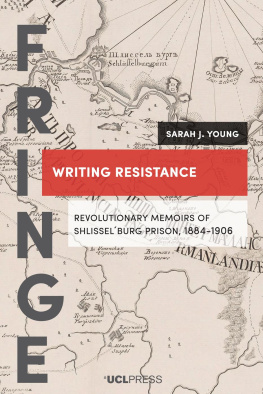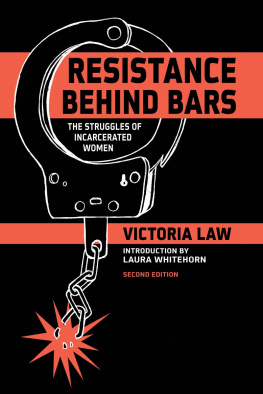FRINGE
Series Editors
Alena Ledeneva and Peter Zusi, School of Slavonic and
East European Studies, UCL
The FRINGE series explores the roles that complexity, ambivalence and immeasurability play in social and cultural phenomena. A cross-disciplinary initiative bringing together researchers from the humanities, social sciences and area studies, the series examines how seemingly opposed notions such as centrality and marginality, clarity and ambiguity, can shift and converge when embedded in everyday practices.
Alena Ledeneva is Professor of Politics and Society at the School of Slavonic and East European Studies of UCL.
Peter Zusi is Associate Professor at the School of Slavonic and East European Studies of UCL.

First published in 2021 by
UCL Press
University College London
Gower Street
London WC1E 6BT
Available to download free: www.uclpress.co.uk
Text Author, 2021
Images Copyright holders named in captions, 2021
The author has asserted her rights under the Copyright, Designs and Patents Act 1988 to be identified as the author of this work.
A CIP catalogue record for this book is available from the British Library.
This book is published under a Creative Commons Attribution-ShareAlike 4.0 International licence (CC BY-SA 4.0). This licence allows you to share, copy and redistribute the work; and to adapt the work providing attribution is made to the author. If you remix, transform or build upon the work, you must distribute your contributions under the same licence as the original. Attribution should include the following information:
Young, S. J. 2021. Writing Resistance: Revolutionary memoirs of Shlissel burg Prison, 18841906. London: UCL Press. https://doi.org/10.14324/111.9781787359918
Further details about Creative Commons licences are available at http://creativecommons.org/licenses/
Any third-party material in this book is published under the books Creative Commons licence unless indicated otherwise in the credit line to the material. If you would like to reuse any third-party material not covered by the books Creative Commons licence, you will need to obtain permission directly from the copyright holder.
ISBN: 978-1-78735-993-2 (Hbk.)
ISBN: 978-1-78735-992-5 (Pbk.)
ISBN: 978-1-78735-991-8 (PDF)
ISBN: 978-1-78735-994-9 (epub)
ISBN: 978-1-78735-995-6 (mobi)
DOI: https://doi.org/10.14324/111.9781787359918
For my parents, Jean Young (19432012) and Wilson Young, for their unconditional support and love. They never understood where on earth my interest in Russian carceral literature came from, and never really suspected that it was at least in part inspired by the copy of Solzhenitsyns The Gulag Archipelago sitting incongruously on their bookshelves when I was young.
Contents
The UCL Press FRINGE series presents work related to the themes of the UCL FRINGE Centre for the Study of Social and Cultural Complexity.
The FRINGE series is a platform for cross-disciplinary analysis and the development of area studies without borders. FRINGE is an acronym standing for F luidity, R esistance, I nvisibility, N eutrality, G rey zones, and E lusiveness categories fundamental to the themes that the Centre supports. The oxymoron in the notion of a FRINGE CENTRE expresses our interest in (1) the tensions between area studies and more traditional academic disciplines; and (2) social, political, and cultural trajectories from centres to fringes and inversely from fringes to centres.
The series pursues an innovative understanding of the significance of fringes: rather than taking fringe areas to designate the worlds peripheries or non-mainstream subject matters (as in fringe politics or fringe theatre), we are committed to exploring the patterns of social and cultural complexity characteristic of fringes and emerging from the areas we research. We aim to develop forms of analysis of those elements of complexity that are resistant to articulation, visualisation or measurement.
The present volume unites three previously untranslated and largely forgotten memoirs by Russian revolutionaries incarcerated in strict solitary confinement in the notorious Shlisselburg Fortress outside St Petersburg between 1884 and 1905. Out of this unique experience of banishment, these writers went on to contribute fundamentally to the forging of Russian revolutionary mythology, though that contribution has since become obscure. In addition to salvaging these memoirs from the neglect into which they have fallen, the volume contains an extensive editors introduction that frames these memoirs as exercises in resistance, explores the practices enabled by constraint, and captures the textual strategies that transform traumatic individual experience into collective memory of injustice.
Alena Ledeneva and Peter Zusi,
School of Slavonic and East European Studies, UCL
My interest in the Populist prisoners incarcerated in Shlisselburg Fortress was sparked many years ago when, pursuing references in Evgeniia Ginzburgs Gulag memoir, I read Vera Figners Memoirs of a Revolutionist . Later, working on my ongoing book project on Russian carceral narratives, I began tracking down and reading memoirs by some of Figners fellow inmates for a section of a chapter on prisoner networks and carceral topographies. The extraordinary situation of these prisoners, and the fact that so many of the survivors wrote about their incarceration and their prison comrades in memoirs, poetry and letters immediately struck me with the immense power of the stories they had to tell, the appalling suffering they endured, and their resilience and willpower in overcoming a seemingly hopeless situation.
I realized that these texts would make a fascinating case study on the construction of an exemplary prison community. I could also see their potential for corpus analysis. I have been experimenting with distant reading techniques for the last few years, not least in response to the vast and still proliferating number of Gulag narratives that have been published (not to mention those in the archives of the human rights organization Memorial and elsewhere), which is far beyond the ability of any single individual to read. The Shlisselburg corpus, comprising 25 texts and less than half a million words, is certainly readable and I have indeed read all the texts, some several times. But focusing on the type of patterns and congruences that can be revealed by distant reading seemed particularly worthwhile in relation to such a unified and complete corpus. As the representation of a significant episode in both Russian carceral history and revolutionary history, written by such a large proportion of those involved (at least, of those who survived), the corpus provides a rare opportunity to interrogate the way memoirs construct their story. Indeed, as I argue in my Introduction, the very point of the majority of these texts especially those published before 1917 was to take control of the narrative of their imprisonment. I use concordance analysis techniques on the corpus to show how their inscription of the process of challenging and transforming the conditions of their incarceration, through the collective they forge, lies at the heart of the story they are advancing.














